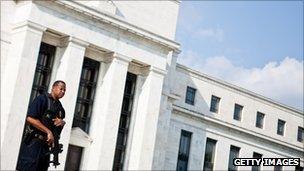Twisting in the wind?
- Published
- comments

Will the Fed's move do a great deal of good to help the US economy?
The US central bank has stepped up to the plate, again, to help support the recovery in the world's largest economy.
We learned on Wednesday morning that the Bank of England is also likely to do more in the coming months.
You are probably bored of my saying that the world is turning to the central banks, in the response to this renewed slowdown, because there aren't many other options left.
But officials at the Federal Reserve and the Bank of England are not happy to be the only game in town. Far from it.
Financial markets would have been taken aback had it not announced a revival of "Operation Twist" on Wednesday, a piece of balance sheet shuffling last attempted more than 40 years ago.
It is also going to reinvest the proceeds of maturing securities to prevent its balance sheet from shrinking over time.
I said something about the mechanics of this a few weeks ago. Will it work? That's a subject for lively debate - in and outside of the Fed.
The consensus appears to be that it is unlikely to do a lot of harm.
But with long-term interest rates already extraordinarily low, and many US corporates already flush with cash that they are not investing, many will question whether it can do a great deal of good for the real economy.
No extra QE
Perhaps more interesting - given the gloomy state of the economic data - is what the Fed did not do on Wednesday.
It did not announce more quantitative easing (QE); which would have meant a net injection of liquidity into the economy.
The whole point of the operation is that the Fed will sell a short-term security for every long-term security they buy.
Nor are they taking the opportunity to change the interest rate paid on banks' excess reserves at the central bank, or making the language on future interest rates any more dovish than it already is.
The statement says it will make the purchases by the end of June 2012. Last year's "QE2" involved purchases of $600bn (£387bn) over eight months - a rate of $75bn a month.
This will be $400bn over more than nine months - around $45bn a month. And, again, these purchases will be precisely offset by sales of securities at the short end.
Long-time Fed watchers tell me that in the past, the kind of economic data we've seen in the past few months would almost always have triggered substantial easing by the US central bank.
As the US economists at HSBC have pointed out, if you look at forward indicators for the economy, or what's happened to the consensus forecasts for the US since the start of the year, it all looks eerily similar to what happened in the first nine months of 2008.
Why has the Fed held back? The short-term answer is that core inflation has been creeping up. But most expect it to come back down again fairly quickly.
The deeper reason is that the last three years have taxed the resources of the world's central banks as well as its governments.
Even supporters of more quantitative easing, in the US and UK, know that more QE will deliver less "bang" for the buck.
Indeed, that is partly why the likes of Adam Posen, on the Bank of England's Monetary Policy Committee, have been publicly making the case for new variations which would seek to boost investment in the real economy more directly.
Future trouble
Another fear is that continually resorting to the "quick fix" of easy central bank liquidity is interfering with the process of mending the balance sheets of banks and households.
Though most have focussed on the stuff about European banks, this was an equally important message coming out of the International Monetary Fund's (IMF's) latest report on the global financial system, published on Wednesday.
The Fund's argument - which we know China, Brazil and the rest would heartily agree with - is that this prolonged period of cheap global liquidity has not just delayed the day of reckoning on the debts of the developed world, but is also building up trouble for the future, by triggering another dangerous "search for yield."
Almost any of the emerging market finance ministers gathering here in Washington this week can tell you about the financial institutions that have come knocking for high-return investments in the past year or so.
The Fed did its bit on Wednesday.
But the IMF is not the only institution to be worried about what may be in store, when the liquidity life support is finally turned off.
PS If you'd read this far, you should tune in to the BBC World Debate: "The Global Economy: A Tipping Point", live from the IMF at 1600 GMT on Thursday.
On the panel are: IMF Managing Director Christine Lagarde; Mohamed El-Erian from Pimco; President Obama's former economics supremo, Austan Goolsbee; and the European Commissioner, Olli Rehn. I'll also be there, to keep them honest.
You'll be able to post comments live during the debate on BBC World News to the twitter hashtag #bbcimf.